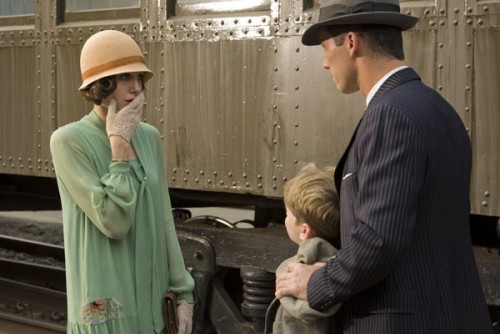Clint Eastwood's Changeling
Angelina Jolie Puffs and Pouts as a Distraught Mother
By: Charles Giuliano - Nov 04, 2008
Based on a true story set in 1928 Los Angeles "Changeling" by Clint Eastwood almost works. During the late years of the former Dirty Harry he has developed from an action hero and maverick cop "Make my day" to a superb and nuanced director. Not that his films always work. He tends to overreach and "Flags of Our Fathers," and "Letters from Iwo Jima," for example, fell on the sword of their own ambition. Review of "Iwo Jima " Review of "Flags of Our Fathers." Which is also the issue with "Changeling."
While the films of Eastwood's "Late Period" are generally well crafted tales mixing and orchestrating story line, characters and performances, this time, he failed to restrain or get more than a limited performance from Angelina Jolie. The range of Jolie's emotions run the gamut from A to B. This is a far more convincing and compelling role than Mariane Pearl in "A Mighty Heart" (2006). But, as an actress, Jolie seems to settle for being a self absorbed star and never really pushes for her full potential. She seems to be a prisoner of her carefully crafted persona and never capable of losing herself in a role.
Instead of a tailor made star role, with no heavy lifting, Eastwood has put her through the demands of a harrowing and horrific true story. The tale of corruption and abuse at the hands of the Los Angeles Police Department, what else is new, is so gut wrenching that the film absorbs and rivets us in spite of the limitations of Jolie's performance.
Christine Collins is a hard working single mother raising her young son Walter (Gattlin Griffith). There are lots of antique cars and trolleys as the film opens in a sepia tone. We find her roller skating up and down a line of female telephone switchboard operators. Back then, somebody had to actually make the connections for telephone calls and there was a lot of room for error. Her job, as a supervisor, entailed trouble shooting a less than perfect system.
As she explains to Walter, his dad was presented with a box called responsibility which he failed to open and subsequently just took off. As a latch key mom she is doing her best including long hours and overtime. So the boy is often left alone. Christine works a Saturday shift when a colleague called in sick. She had promised to take Walter to the movies.
Returning home he is nowhere to be found. After knocking on neighbors doors and searching back yards she makes the dreaded call to report a missing child. The office on duty explains the rules that the police do not start to search for 24 hours as, most of the time, the lost child returns home by then. Her desperation and anguish, doled out in weeping increments, mounts as days, weeks, and months go by.
Until Captain Jeffrey Donovan (J.J. Jones) of the Juvenile Department, who has been investigating the case, calls to tell her that they have found Walter. There are reporters and photographers at the train station to cover the joyful reunion which has been orchestrated by Chief James E Davis (Colin Feore). The cops are looking for positive PR as piles of bodies, assassinated criminals, have been turning up on the street. While allegedly cleaning up crime in L.A. the department is on the take from rum runners during Prohibition.
Finding the missing Walter is a win win. Until, with horror, Christine does not recognize her son. Because of time and circumstances, the Captain insists, he has changed. The boy is asked his name and address promptly blurting out the right answers. As flash bulbs pop she is coerced to take him home. But nothing fits. Before Walter went missing she had measured his height by making a mark on the wall. The alleged Walter is inches shorter. During a bath, unlike the real Walter, the boy/ imposter is discovered to be circumcised. A doctor sent by the cops to examine the boy has an explanation for everything and insists that Christine is hysterical and delusional. The case against her mounts as a deranged and unfit mother who is refusing to care for her own son.
During a confrontation in Donovan's office, when she continues to insist that the boy is not Walter, she is put in handcuffs and taken to a hospital for the criminally insane. There we see her undergo a brutal cavity search and water hosing. Jolie cringes and cowers through Snake Pit sequences but refuses to sign the incriminating papers that will declare her delusion and free the police of all responsibility. It appears that the sadistic head of the hospital, Dr. Jonathan Steel (Denis O'Hare), is on the take. The hospital is a dumping ground for alleged enemies of the L. A. P. D. Christine is not the only "patient" who has been locked up without due process of law.
In grim interviews with the supervising psychiatrist whatever she says is construed against her. True insanity is the inevitable result of prolonged "treatment." In a perverse twist of law one must be sane in order to appear in court. So the "criminally insane" often face life sentences even for misdemeanors or trumped up charges. There is no process by which they get a day in court unless there is someone on the outside fighting on behalf of the patient. In this case, Reverend Gustav Briegleb, played with remarkable intensity and restraint by the always fascinating John Malkovich. He is leading a crusade against police corruption.
There is another wild card in the form of an honest cop, Detective Lester Ybarra (Michael Kelly). In the process of tracking down a juvenile fugitive from Canada the boy confesses to having been an accomplice with an uncle, Gordon Northcoff (John Buler Harner) who is a serial killer of young boys. One of whom may have been Walter. But his superior, Captain Donovan, refuses cooperation. On his own Ybarra visits the farm where the boy leads him to a series of graves. This launches a man hunt for Northcoff and his eventual trial and grim execution. The hanging scene, with Christine as a witness, is gratuitously graphic.
These circumstances exonerate Collins and lead to taking down the LA police department including the termination of the Chief and Captain. In the process Christine is completely vindicated but never loses hope of one day finding Walter.
For most of this film we were truly absorbed by a compelling story. Eastwood presented a heroic feminist standing up against brutality and corruption. It almost worked. He came ever so close to evoking from Jolie the best performance of her career. Despite the limitations and failure of expectations, as is usually the case with Eastwood, we were glad to have seen this film. Though flawed and ultimately disappointing Eastwood never fails to give us less than an honest day's work.





